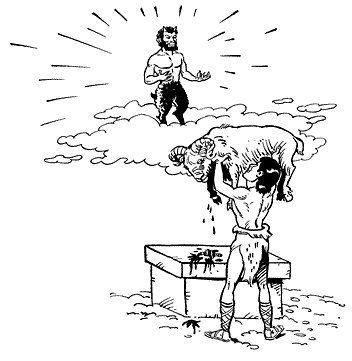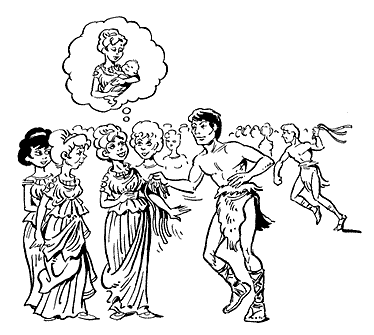To complete the calendar year, the Romans inserted a blank number of days or an occasional intercalary month in the “dead” season of midwinter, between the last month of the year (December) and the first month of the next year (March).
- Tradition says that Numa Pompilius, the legendary second Roman king (circa 715-672 B.C.; AUC 39-82) added the months of Januarius (Ianuarius) and Februarius for the previously unnamed period.
- Julius Caesar revised the lengths of the months in his calendar reform.
- He gave February 28 days, except for every fourth year, when it had an extra day between February 23 and 24 (not at the end of the month as it is now).
- The name, Februarius, came about because of the Roman ceremonies for religious purification and expiation which took place during that month in anticipation of the new year; which originally started on March 1.
- The most important festival in February was the Lupercalia, the ancient feast of fruitfulness, or fertility, on February 15.
- The Lupercalian festival was an ancient fertility rite whose origins are lost in antiquity and may even predate civilization.
- These religious rites were under the supervision of a group of priests called the Luperci that was divided into two colleges called Quinctillani and Fabiani and each was in charge of a master (magister).
- In 44 B.C., a third college, the Luperci Iulii, was established in honor of Julius Caesar; and on February 15 of that year, Mark Antony, as its magister, offered to make Caesar king, just a month before Caesar’s assassination.
- The Lupercalian rites began as the priests gathered in the cave of Lupercal on the southwestern part of the Palatine Hill.
- There the priests sacrificed goats and a young dog to the god Faunus, after which the foreheads of two youthful Luperci of high rank were smeared with the blood of the victims.

- Later the blood was wiped off with wool dipped in milk, then the ritual required the two young men to laugh.
- After a sacrificial feast, they stripped themselves naked and put on a “loin skin” from the skins of the slain goats.
- Holding strips of the hides, they ran around the walls of the old Palatine community, hitting or snapping at all of those they came close to, especially women; an action which was believed to bring fertility, even to barren women, and a safe delivery in childbirth.
- The goat-skin thongs were called februa, purifiers, which was derived from februo, to purify, and the day of purification.

- William Shakespeare made use of the “Feast of the Lupercal” when he had Julius Caesar tell his barren wife, Calphurnia, to “Stand you directly in Antonio’s way when he doth run his course.” Then he instructed Mark Antony, “Forget not in your speed, Antonio, to touch Calphurnia; for our elders say, the barren, touched in this holy chase, shake off their sterile curse.” Julius Caesar, Act I, Scene ii, lines 3-9.
- The Lupercalia was observed well into the Christian era. It is said that Pope Gelasius I introduced the Feast of the Purification of the Virgin Mary, called Candlemas in A.D. 494, to counteract the excesses of the pagan celebrations of the Lupercalia.
- The Saxons called the month of February Sol-monath in recognition of the returning strength of the sun.
George Washington’s Birthday Had Eleven Days Added to Its Original Date
- George Washington, first president of the United States, was born on February 11, 1731, under the Old Style or Julian (Caesar) calendar which was still in use in England and the American colonies.
- Under the Gregorian or New Style calendar, Washington was born on February 22, 1732.
- When the New Style calendar was accepted in England, the new year was changed from March 25 to January 1.
- As an indication of both calendar reckonings, sources sometimes give Washington’s year of birth as 1731/1732.
- When the New Style calendar was adopted in 1751, the English Parliament decreed that 11 days were to be legally omitted from the month of September in 1752 to correct the errors in the Old Style calendar.
- The day after September 2 became September 14 as a result of the decree.
- Technically this change required that the addition of 11 days was to be added to the birth dates of all British and American colonial persons born between 1700 and 1752.
- The people who were involved in such date changes often refused to adopt the new dates because they were accustomed to the previous system of dates.
- George Washington, for example, continued to celebrate his birthday on February 11 until about 1790 or 91.
- On the occasion of his 46th birthday, at Valley Forge the band of the Fourth Continental Artillery serenaded the general on February 11, 1779.
- Three years later, in 1781, Count de Rochambeau, commander of the French allies then stationed in Newport, Rhode Island, honored Washington by declaring February 11 a holiday. To celebrate the day, the “French troops paraded through the city, and the French and American officers dined together”.
- Richmond, Virginia, claims the honor of being the first locality to sponsor a public celebration of Washington’s birthday.
- In 1782, just as at Valley Forge and in Rhode Island, Richmond held its special festivities on February 11 and “demonstrations of joy” filled the city on that day.
- By the following year, however, the Gregorian (New Style) calendar introduced in 1752 had gained sufficient acceptance to affect the celebration of the Commander-in-Chief’s birthday.
- In 1783, Talbot Courthouse in Maryland, as well as Cambridge, Massachusetts, and New York City, commemorated the 51st anniversary of Washington’s birth.
- Maryland and Cambridge, Massachusetts honored Washington on February 11.
- New York City paid its respects on February 22. In the morning, New York harbor sounded a gun salute, and in the evening “a number of men dined together, heard speeches praising Washington, and exchanged 13 toasts—one for each of the original 13 colonies.”
- New York’s 1783 ceremonies are generally recognized as the first public acknowledgment of Washington’s birth to take place on February 22.
- During Washington’s first terms as President, celebrations of his birthday on February 22 increased. In 1790, on February 22, Congress adjourned their meeting in New York City to extend to him their congratulations.
- The following year Philadelphia became the nation’s capital and the new seat of government continued the custom of honoring the President on his birthday on February 22.
- When Washington died on December 14, 1799, with the grief of his death fresh on their minds, Congress passed a resolution calling on the nation to observe February 22, 1800, with “appropriate exercises”.
- Public Law 90-363 which has changed the federal observance of certain holidays to Mondays, was enacted by the U.S. Congress in 1968 and became effective in 1971. In some states, the occasion is officially known as “Presidents’ Day”, or as “Washington-Lincoln Day”.
An age builds up cities; an hour destroys them.
—Seneca

You may return to the
main lists of months and years from here.
 FREE searches
FREE searches of words derived from Latin and Greek sources.

Free Focusing on Words
Newsletter subscription form.
 E-mail Form
E-mail Form for comments or type in
words@wordquests.info, if you prefer.